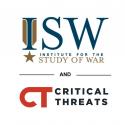Russian Offensive Campaign Assessment, February 4, 2025
Feb 4, 2025 - ISW Press
International Atomic Energy Agency (IAEA) Director General Rafael Mariano Grossi visited the Kyivska Electrical Substation in Kyiv Oblast on February 4 to assess damage to the substation as Russian long-range strikes targeting energy infrastructure continue to threaten Ukraine's nuclear power plants (NPPs) and Ukraine's energy production capabilities. Grossi did not specify when Russian forces damaged the Kyviska Electrical Substation but emphasized that a direct strike on the substation or a power supply disruption could cause a nuclear accident.










